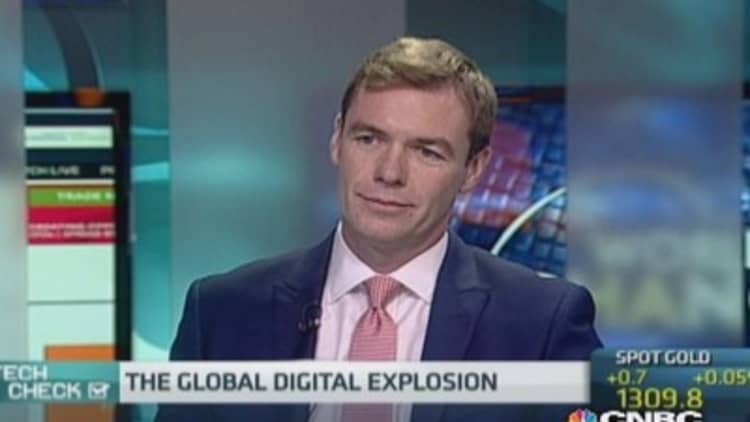Banks and payments giants would like to cultivate a better relationship with America's unbanked—the poor rung of society typically targeted by payday loan predators—and Silicon Valley is anxious to arm Wall Street with a data-based approach for the effort.
Unbanked consumers are a riddle that has confounded the banking sector for years. Twelve million Americans turn to payday loans out of financial desperation, spending roughly $7.4 billion annually on loans with interest rates of 400 percent on average, according to the Pew Charitable Trusts. It may be a controversial consumer segment to target, but there are profits in the underclass for financial institutions that get it right.
Companies like ZestFinance are using machine learning models and so-called "alternative data" sets for what Silicon Valley-backed Zest claims is a better way to assess creditworthiness and lend to the "unlendable."
"We use data that isn't quite captured in the big three [primary credit bureaus], but it's really helpful in determining creditworthiness," said Douglas Merrill, founder and CEO of ZestFinance.
Unlike traditional credit underwriting models, many big data models use mobile prepaid data, psychometric testing—questionnaires that analyze borrowers' character traits, e-commerce payment history and social data/online activity to conduct consumer-risk assessments, according to research conducted by MasterCard Advisors.
Read More3 reasons why Wall Street is eyeing Bitcoin
"Social data may avail of well over 100 information sources—private and public—for their risk model," MasterCard Advisors stated in its report.
ZestFinance, which has secured $112 million in venture capital, uses more than 80,000 data points to create credit profiles on potential borrowers. Then it scores that data and sells the information to lenders. The company would not name clients, but it said it works with short-term lenders, cable companies seeking to win back customers who switched providers, and collections agencies.
Other start-ups operating in the sub-prime underwriting space, with Silicon Valley-based investors, include LendUp, Wonga (U.K.-based) and Think Finance.
Merrill, a former Google CIO, said before the U.S. developed a standardized credit score system, credit risk was assessed by a real person who would, in part, judge people by their personal interaction with them.
"Moving back toward that credit officer in the 1950s, who knew so much about you, is important," Merrill said. "Banks have been struggling to try and address this problem for a long time, but they didn't have the mathematical tools needed to fix the problem."
Today, Merrill says by using tens of thousands of variables when underwriting, he's able to simulate that personal relationship.
There certainly are problems with Equifax, Experian and TransUnion, and there are definitely communities where those traditional credit-reporting tools don’t work well, but I’m not sure that big data is the answer to that.Persis Yustaff attorney at the National Consumer Law Center
Merrill represents the Silicon Valley mantra that "all data can be used as credit data," but Persis Yu, a staff attorney at the National Consumer Law Center, said the tech utopians are oversimplifying the challenge.
"There certainly are problems with Equifax, Experian and TransUnion, and there are definitely communities where those traditional credit-reporting tools don't work well, but I'm not sure that big data is the answer to that," said Yu. "If you're using thousands of data points, the ability to ensure accuracy just seems to be impossible." She added: "If you look at a thousand variables, you're going to find a correlation somewhere in there. The explanations sound great, in theory, but these algorithms are also proprietary, and I can't test them if I want to."

Merrill said the credit scores his company comes up with are accurate and support advanced mathematical models.
"The thing that's important here is not the individual signals themselves. … What's important is that you can use a bunch of signals together," Merrill said, adding that using large amounts of data enables the machine to "overcome the impact of erroneous data."
Yu said big data analytics should be regulated before being accepted as a trusted credit-risk assessment tool. She said there needs to be regulation that defines how the Fair Credit Reporting Act applies to companies like ZestFinance in order to ensure transparency.
The lenders don’t know the good guys from the bad guys, who can afford the loan and who can’t, so they just charge a high rate to everyone.Mark HookeyDemystData CEO
A typical two-week payday loan with a $15 per $100 fee equates to an annual percentage rate of around 400 percent, according to the Consumer Financial Protection Bureau. By comparison, APRs on credit cards range from about 12 percent to 30 percent.
Regulators and Wall Street banks have paid much more attention to payday loans in recent years with increased scrutiny from the press in the post-financial crisis world, but the problem has not disappeared, and online platforms for payday lenders make it an even harder problem to root out.
Last Thursday a group of payday lenders filed a lawsuit against three U.S. banking regulators, saying a federal antifraud initiative unfairly targets them by claiming the lenders are "reputationally risky" to the banks serving them. The Department of Justice's investigation, known as Operation Choke Point, led more than 80 banks, including Bank of America, Capital One Financial, JPMorgan Chase and Fifth Third Bancorp, to terminate business relationships with payday lenders as a result of the regulatory crackdown, according to the lawsuit.
Read MoreSilicon Valley's plan to replace wealth managers
Mainstream lenders, meanwhile, have launched their own initiatives to promote financial inclusion for the underbanked.
American Express recently sponsored "Spent: Looking for Change"—a so-called docu-ad that promotes its new venture with Walmart Stores—a mobile banking service called Bluebird and a line of prepaid cards.
The companies said the services will not carry monthly or annual fees or charges for overdraft, bill pay or inactivity.
The 2.5 billion adults [around the world] without access to financial services are disproportionately women and young people. ... There are at least 44 million unbanked or underbanked people in the United States, so clearly financial inclusion is needed in all markets.Ajay BangaMasterCard CEO
MasterCard launched a slew of initiatives to enable financial inclusion and challenge previously held notions of the unbanked and underbanked in the U.S. and in emerging markets.
"The 2.5 billion adults [around the world] without access to financial services are disproportionately women and young people and include many who are employed or living in urban centers," MasterCard CEO Ajay Banga said in a statement. "And there are at least 44 million unbanked or underbanked people in the United States, so clearly financial inclusion is needed in all markets, not just the developing world."
The final frontier (of bank customers)
It's not just public relations when it comes to the financial giant's relationship with the unbanked, said Mark Hookey, CEO of New York City and Hong Kong-based DemystData. The unbanked are the final frontier of customers left to target.
Hookey said efforts to promote financial inclusion will increase as commercial credit institutions seek ways to capitalize on the unbanked. The sub-prime space has become attractive to banks, even amid the greater scrutiny associated with payday lending, because the banks have few niches left in which to grow their consumer base.
The prime segment—made up of ideal borrowers with a house and a mortgage, a high income and plenty of money in the bank—is already well banked, Hookey said, and traditional lenders see the sub-prime space as an untapped market, dominated by predatory lenders.
"In the U.S. it's really hard for lenders to grow in what would have traditionally been called a prime segment. That segment is very heavily saturated, and it has been for a long time," Hookey said.
Read MoreWill AI dominate Wall Street's future?
The premise for ZestFinance and DemystData is that many people who live off the financial radar and would normally turn to a payday loan might actually qualify for a better loan at a traditional credit institution if the institution had more data about them.
"The absence of information is leading lenders to charge them way too high of a price or just outright decline them," Hookey said. "The lenders don't know the good guys from the bad guys, who can afford the loan and who can't, so they just charge a high rate to everyone."
DemystData sells "alternative data" customer relationship software to short-term lenders and banks in the U.S., U.K and across the Asia Pacific region (half of its business is in the U.S.).
"There's absolutely no shortage of financial institutions across the globe who are aggressively seeking to invest in big data" to better understand the unbanked, Hookey said.
JPMorgan Chase recently unveiled a $30 million five-year commitment to establish a Financial Solutions Lab.
"It's too expensive to be poor in America, and it's getting worse," Noah Wintroub, managing director of Internet and digital media for JPMorgan Chase told CNBC.
The wolf of Silicon Valley's Wall Street
The rush to reach the unbanked includes a controversial element beyond banking fees and interest rates: Despite the amount of funds being poured into the technology, it's common for data owners to secretly sell and trade proprietary data sets to other brokers, a practice Hookey said consumers should be informed about.
"When most people hear alternative data, they think, 'Oh, my God, they're watching my friend list on Facebook,' but we don't do that," Merrill said.
Yu advocates for more transparency in the growing industry and said trading between data brokers is a fundamental flaw in the industry and there needs to be a way to make sure brokers are following the rules and only sharing data with "scrupulous entities" using the data in legal ways.
"It's an industry that's cleaning itself up from a rather shady past, and it's certainly an industry that consumers are largely unaware of," Hookey said. Unlike ZestFinance, DemystData does not own any data, only selling the software to allow banks to collect better data on their own.

Last month the Federal Trade Commission recommended that Congress consider enacting legislation that would require data brokers—companies that collect consumers' personal information and resell or share it with other companies—to be more transparent and give consumers greater control over their personal data.
"The extent of consumer profiling today means that data brokers often know as much—or even more—about us than our family and friends," FTC Chairwoman Edith Ramirez said in a statement. "It's time to bring transparency and accountability to bear on this industry on behalf of consumers, many of whom are unaware that data brokers even exist."
Merrill agreed that there needs to be more transparency and he believes it will come as the ecosystem for unbanked matures. "Data on consumers ought to be the property of those consumers and they should have the ability to say if it's incorrect. The problem is, operationally, that's hard to do."
For right now, Merrill is focused on leading the industry away from predatory lending.
"We're just trying to find a way to save the underbanked community thousands of dollars," Merrill said. "Over the next 10 to 15 years, you'll see most lending institutions moving away from traditional underwriting methods that use 100 data points or less."





